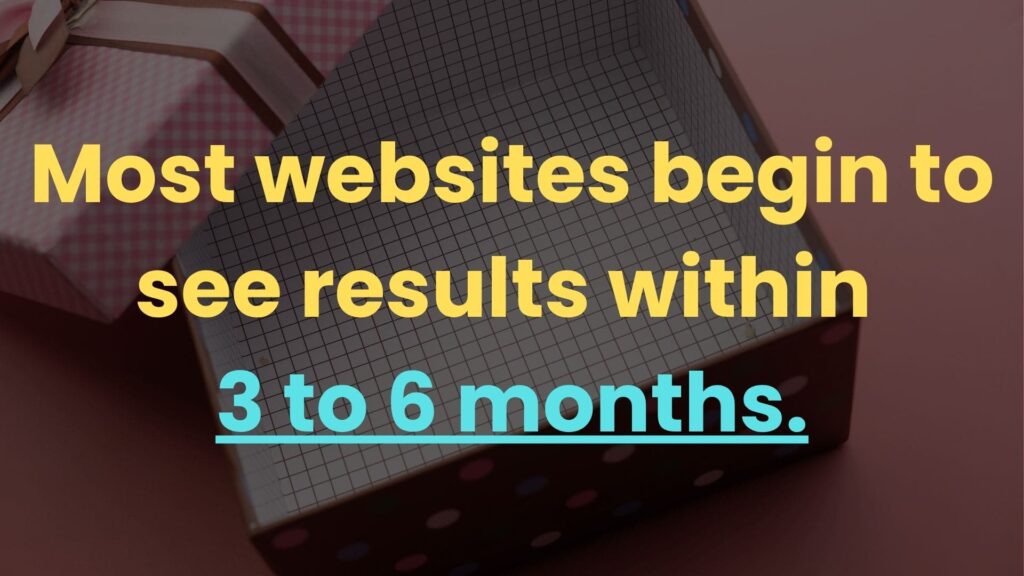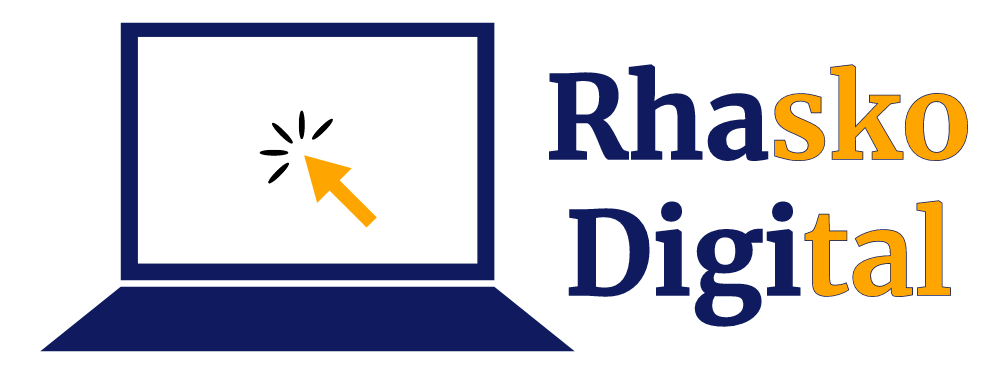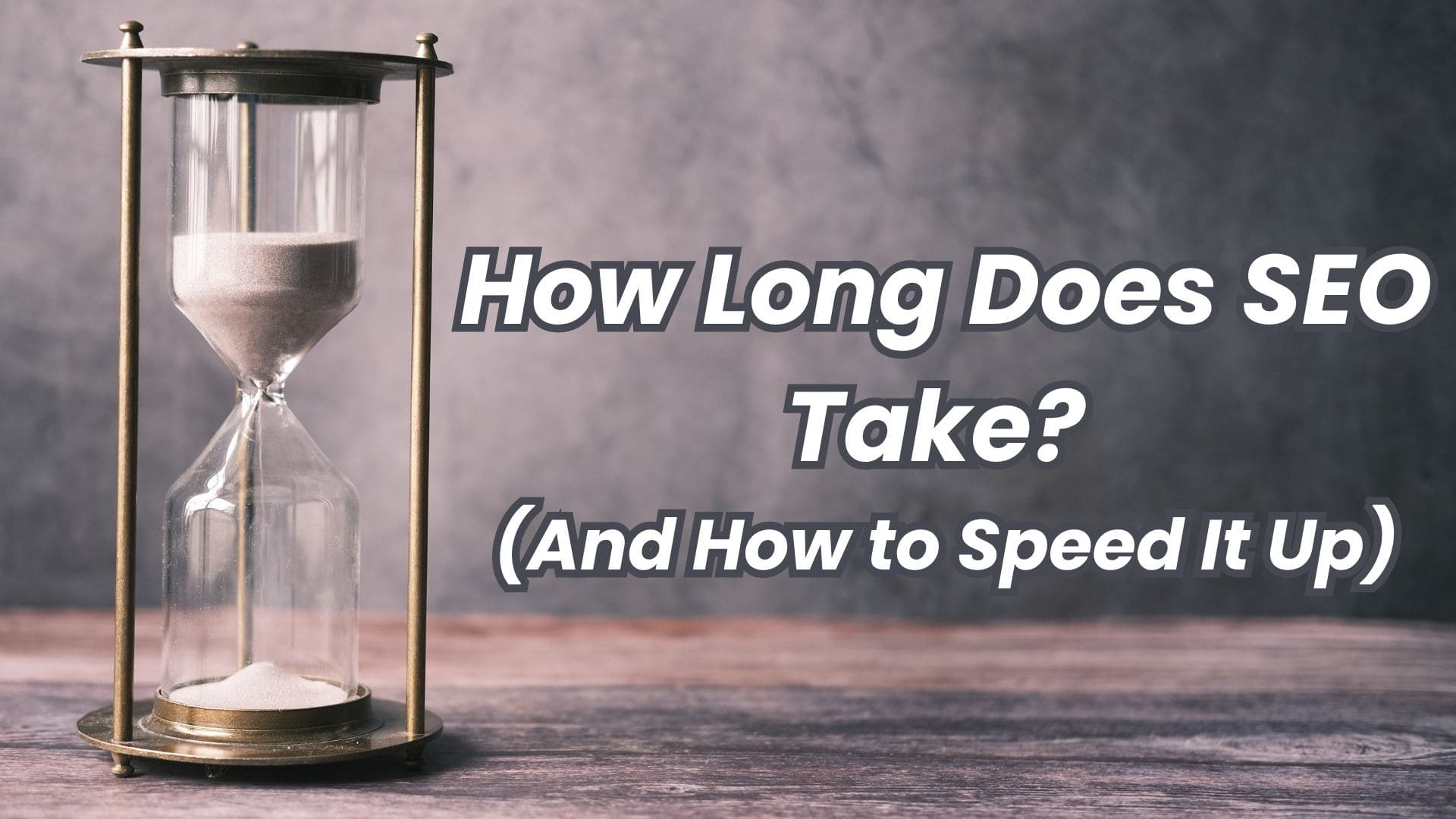Skip to contentIntroduction: SEO Is a Long Game—But How Long Exactly?
One of the most common questions business owners and marketers ask is: how long does SEO take? It’s a fair question—especially when you’re investing time and money into improving your online visibility. But the honest answer is: it depends.Unlike paid ads, SEO doesn’t deliver instant traffic. It’s a long-term strategy that builds momentum over time. While this might sound discouraging, it's actually one of SEO’s greatest strengths. Unlike quick-fix tactics, good SEO generates sustainable traffic and compounding results month after month—if you do it right.That said, some sites start seeing meaningful results within a few weeks or months, while others may need six months or more. What causes that difference? In this article, we’ll break down the key factors that affect how fast SEO works, what realistic timelines look like, and—most importantly—how to speed things up without resorting to shady tactics that can hurt your site in the long run.Whether you're just getting started or trying to improve your current SEO performance, this guide will help you understand what to expect—and how to move faster in the right direction. Especially for your business growth.Key Takeaways:- SEO is a long-term investment with compounding value.
How Long Does SEO Take to Work?
The short answer is Most websites begin to see measurable SEO results within 3 to 6 months. Some websites even take up to 12 months or more. But there’s no universal timeline. SEO is influenced by several moving parts—some within your control, some not.Search engines like Google need time to discover, crawl, index, and then evaluate your content. If your website is new or operating in a highly competitive niche, it might take longer to climb the rankings. On the other hand, if your domain already has some authority and technical SEO is in good shape, progress can happen faster.Here are some of the main factors that impact how long SEO takes:- Website history and domain authority – Older, more trusted sites usually rank faster.
- Keyword competition – High-volume, high-competition keywords require more time and effort.
- Content quality and relevance – Valuable, well-structured content gets indexed and ranked quicker.
- Technical SEO – Issues like slow site speed or crawl errors can delay results.
- Backlink profile – Earning high-quality backlinks accelerates credibility and visibility.
It’s common to notice early signs of movement—such as increases in impressions or low-ranking keywords—within the first month or two. But for consistent organic traffic and leads, patience and persistence are essential. How long does SEO take to work?
Most websites start to see SEO results in 3 to 6 months, depending on factors like competition, content quality, and site authority.Key Takeaways:
How long does SEO take to work?
Most websites start to see SEO results in 3 to 6 months, depending on factors like competition, content quality, and site authority.Key Takeaways:- Measurable SEO results often appear after 3–6 months.
- Timelines depend on domain age, content strength, and competition.
- SEO momentum builds over time—early wins may show up in smaller ways.
Why SEO Takes Time: Understanding the Process
If SEO takes months, you might wonder—what exactly is happening during that time? Why can’t Google just rank a good page immediately?The truth is, SEO isn’t a single action—it’s an ongoing process. Search engines work to provide the most relevant, trustworthy results to users. To do that, they need to evaluate your entire website, your content strategy, and how others on the web respond to and reference your site.Here’s what typically unfolds behind the scenes:- Crawling and Indexing: Google first needs to find your content, understand what it’s about, and determine whether it’s worth indexing. This alone can take days or weeks, especially for new pages or sites.
- Algorithm Evaluation: After indexing, your content competes with countless others. Google’s algorithms assess keyword relevance, freshness, authority, page speed, and user behavior to decide where you belong in the results.
- Building Trust Over Time: Google favors websites with proven track records. Earning that trust requires consistently publishing high-quality content, gaining backlinks, and offering a good user experience.
- External Signals Matter: SEO is not just about what’s on your website. Google watches how others interact with your content—Do people stay on your page? Do reputable sites link to you? These signals take time to build.
Unlike paid ads, you can’t “force” SEO success. But that’s also why SEO brings long-term value: once you’ve earned your rankings, they’re more stable and cost-effective to maintain.Key Takeaways:- SEO involves multiple phases—crawling, indexing, evaluation, and trust-building.
- Google rewards consistency, relevance, and quality—not shortcuts.
- A strong SEO foundation compounds over time, leading to durable results.
How to Speed Up SEO Results Without Cutting Corners
If you're wondering how to improve SEO faster without breaking Google's rules, you're not alone. Every business wants quicker results—but rushing SEO the wrong way can backfire. Google penalizes sites that use manipulative tactics, and recovering from those penalties can take months, or worse—never fully happen.The good news? There are proven, ethical strategies you can use to accelerate progress and start seeing early wins.1. Target Low-Competition, High-Intent Keywords
One of the easiest ways to rank faster is by choosing low-competition keywords that still match what your audience is searching for. Instead of trying to rank for "SEO services" (which could take years), go after more specific queries like:- “affordable SEO for local businesses”
- “how to improve SEO for WordPress blogs”
- “fast SEO results for ecommerce sites”
These are called long-tail keywords, and while they may have lower search volume, they often bring in better-qualified traffic and are easier to rank for quickly.2. Improve Your Site’s Technical SEO
Google won’t rank a site that’s slow, hard to crawl, or poorly structured. Some high-impact improvements you can make:- Speed up your website by compressing images, using caching, and choosing reliable hosting.
- Make sure your site is mobile-friendly and passes Core Web Vitals.
- Fix crawl errors in Google Search Console and ensure proper internal linking.
Technical SEO doesn’t take long to fix—but it has long-lasting effects.3. Focus on Content That Solves Real Problems
Publishing random blog posts won’t help if they don’t serve a clear purpose. To get faster results, create content that answers real user questions. Use keyword research tools to find what people are searching for (like “how long for SEO to work” or “how do I improve SEO”) and write content that addresses those needs in depth.Google prefers helpful, well-structured, and original content. Format your posts clearly, use headings, include bullet points, and make your information skimmable.4. Update and Optimize Existing Content
One of the fastest ways to boost SEO is to improve what you already have. Instead of only creating new content, go back and:- Refresh outdated posts with new stats or better explanations.
- Optimize meta titles and descriptions to improve CTR.
- Add internal links to newer content.
- Include relevant keywords naturally, like “how to increase SEO of a website.”
Google often re-crawls updated content faster than brand-new posts.5. Build High-Quality Backlinks Strategically
Backlinks are still one of the strongest ranking signals—but not all links are equal. Avoid spammy tactics like buying links or joining shady directories. Instead, earn links by:- Creating original, data-driven content others want to cite.
- Writing guest posts for reputable industry blogs.
- Reaching out to sites you've mentioned in your content and offering collaboration.
Start small—getting a few high-quality backlinks can have a bigger impact than dozens of low-quality ones.6. Submit New Pages via Google Search Console
Whenever you publish or update content, don’t just wait and hope Google finds it. Use Google Search Console’s URL inspection tool to request indexing. This can help speed up crawling and ensure your new pages enter Google’s system quickly.7. Stay Consistent and Monitor Results
SEO is not a one-time effort. To build momentum, stay consistent with your publishing schedule, continuously optimize based on performance, and use tools like Google Analytics and Google Search Console to track what’s working.Look for early signs of progress like:- More impressions and clicks in Search Console.
- Improved average ranking for target keywords.
- Growth in branded search or organic traffic.
Even small wins show your SEO efforts are moving in the right direction.Key Takeaways:- Focus on long-tail, low-competition keywords to rank faster.
- Improve technical SEO, refresh old content, and publish useful answers to user questions.
- Use Google Search Console to speed up indexing and track results early.
Why Going Faster Requires Precision—and Experience
Trying to speed up SEO can be tempting, but it’s also where many businesses go wrong. There’s a fine line between doing things faster and doing them wrong. And unfortunately, mistakes in SEO don’t just slow you down, they can drag your rankings down, sometimes permanently.This is especially true when it comes to the technical side of SEO.Many of the strategies that accelerate SEO—such as fixing crawl issues, optimizing site architecture, or improving Core Web Vitals—require deep technical knowledge. These aren’t tasks you can safely guess your way through.Missteps like these are surprisingly common:- Blocking Google from crawling important pages via robots.txt
- Accidentally removing a page’s indexing through incorrect meta tags
- Slowing down your site with poorly coded plugins or unoptimized scripts
- Overusing keywords or adding irrelevant backlinks that trigger spam signals
Each of these errors can undo months of progress. Worse, you may not even realize the mistake until traffic starts to drop—by then, recovery becomes costly and time-consuming.SEO Education Isn’t Free
While it’s absolutely possible to learn SEO on your own, it comes with hidden costs—training, time, and trial-and-error. Courses, tools, and technical resources can add up quickly. More importantly, if SEO isn’t your full-time job, you might not have the time or capacity to keep up with constant Google algorithm updates, new technical standards, and the nuances of competitive keyword research.That’s why many business owners, marketers, and even developers choose to bring in experts when SEO becomes too complex or too risky to handle alone.Save Time and Resources by Working with an SEO Specialist
At Rhasko Digital, I understand that SEO success isn’t just about ranking—it’s about doing things right, the first time. My approach is data-driven, technically sound, and tailored to your business goals. Instead of spending months (or years) learning through trial and error, you can leap ahead by leveraging our expertise.Whether you're struggling with slow progress, want to fix technical issues, or simply want faster, safer results, hiring the right SEO partner can be one of the most cost-effective decisions you make.You don’t have to do everything yourself, let’s work together to build sustainable, measurable growth.Key Takeaways:- Technical SEO mistakes can slow progress—or trigger ranking drops.
- Learning SEO alone takes significant time, money, and risk.
- Working with experts like Blue Digital helps you avoid costly errors and grow faster.
SEO Takes Time—But the Long-Term Value Is Worth It
It’s true—SEO doesn’t deliver instant results. Unlike paid ads, where you can see clicks the same day you launch, organic search takes weeks or even months to show visible improvement. But this delay isn’t a flaw. It’s a reflection of how search engines work: they reward trust, authority, and consistency—qualities that can’t be built overnight.Think of SEO like planting a tree. The first few weeks, you may not see much happening above the surface. But if you keep watering and nurturing it, you’ll grow strong, stable visibility that lasts for years. And unlike paid traffic, where your exposure disappears the moment your budget runs out, SEO rankings can continue generating leads and sales with zero cost per click once you’ve earned them.SEO Is Ideal for Businesses That Rely on Long-Term Visibility
Not every industry is built for fast cycles. If your business depends on being discoverable when customers search for information, solutions, or services—SEO is one of the most powerful investments you can make.Here are just a few types of businesses that benefit greatly from long-term SEO:- Local service providers – plumbers, roofers, HVAC, cleaning services, landscapers
- E-commerce brands – especially niche stores competing with bigger names
- Professional services – law firms, accounting firms, consultants, architects
- Educational platforms – online courses, training centers, tutors
- Healthcare practices – dentists, clinics, therapists, chiropractors
- Travel and tourism businesses – destination guides, tour operators, boutique hotels
- Creative agencies & freelancers – designers, writers, marketers, developers
What do all of these have in common? Their customers often begin their journey with a Google search—and showing up at the top means the difference between gaining or losing that lead.
SEO Is a Marathon, Not a Sprint—But It Pays Off
If you’re asking, “How long does SEO take to work?”—the most honest answer is: it depends. Your starting point, your competition, your strategy, and your consistency all matter. But for most websites, early improvements can be seen in 3–6 months, with stronger results compounding over 12+ months.The key is patience—and precision. By investing the time and effort up front, you’re building a digital asset that can pay off for years to come.Ready to turn your website into a lead-generating machine—without relying on paid ads forever? SEO might take time, but it’s time well spent.If you’d like expert help mapping out a strategy tailored to your business, Rhasko Digital is here to support you every step of the way.💡Email info@rhaskodigital.com How long does SEO take to work?
Most websites start to see SEO results in 3 to 6 months, depending on factors like competition, content quality, and site authority.Key Takeaways:
How long does SEO take to work?
Most websites start to see SEO results in 3 to 6 months, depending on factors like competition, content quality, and site authority.Key Takeaways:

